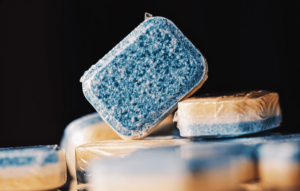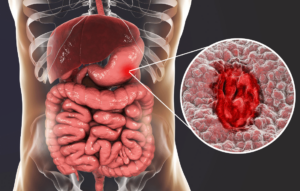In a recent study, researchers have shed light on a serious risk lurking in our kitchens: dishwasher detergents and rinse agents, commonly used in both professional and household settings, may be contributing to chronic inflammatory diseases linked to gut health.
The study investigated how these common cleaning agents impact the gut’s epithelial barrier, focusing on cellular toxicity, barrier function, and inflammatory responses in gastrointestinal cells. With dishwashers now present in the majority of American kitchens, this study presents some seriously crucial findings for anyone concerned about how their environment can be affecting their health.

Understanding the Gut Epithelial Barrier and Its Role in Health
The gut epithelial barrier serves as a frontline defense against harmful substances, selectively allowing beneficial nutrients into the bloodstream while blocking pathogens and toxins. When this barrier becomes “leaky” or compromised, a host of health issues can arise. Known as “leaky gut syndrome” this condition is associated with chronic inflammatory diseases, autoimmune disorders, and metabolic issues. Keeping this barrier intact is crucial for maintaining overall health.
According to the study, exposure to rinse agents and detergents, specifically those found in dishwashers, may play a previously overlooked role in damaging the gut barrier, potentially increasing the risk of these inflammatory conditions.
Key Findings From The Study
Researchers used a variety of sophisticated techniques, including RNA sequencing, immunofluorescence staining, and gut-on-a-chip technology, to investigate how dishwashing chemicals interact with gut epithelial cells. Here are some of the significant findings:
- Toxic Effects of Rinse Agents: The study found that rinse agents, even at low concentrations, can have cytotoxic effects on gut epithelial cells. This means that these chemicals damage cell structures, hindering their function and viability.
- Barrier Disruption: When epithelial cells were exposed to rinse agents in a controlled lab environment, they showed a marked decrease in transepithelial electrical resistance. This measure is a critical indicator of cell barrier integrity, and a reduction in resistance means that the cells are becoming more permeable – essentially, the barrier is becoming leakier.
- Increased Paracellular Flux: Paracellular flux is a measure of how easily substances pass between cells. An increase in this flux indicates a weakened barrier, allowing more potentially harmful particles to pass through. In the context of the gut, this can lead to unwanted materials, like bacteria and toxins, entering the bloodstream.
- Damage from Alcohol Ethoxylates: The research pointed to a specific component in rinse aids, alcohol ethoxylates, as the primary culprit behind barrier damage and cell toxicity. This ingredient is common in many rinse aids due to its surfactant properties, which help to make dishes appear spotless. However, its negative impact on epithelial cells warrants serious reconsideration of its use.
- Remnant Detergents on Dishes: Residue from dishwasher detergents and rinse aids often remain on dishes and utensils even after the wash cycle is complete. In professional settings, where higher concentrations of rinse aids
 are used, the residual amounts on “clean” dishes are even more pronounced. This means we are potentially ingesting variable amounts of these toxic substances with every meal, leading to chronic exposure over time.
are used, the residual amounts on “clean” dishes are even more pronounced. This means we are potentially ingesting variable amounts of these toxic substances with every meal, leading to chronic exposure over time. - Cellular Response and Inflammation: Exposure to these chemicals led to an increase in genes associated with cell death, immune signaling, and inflammatory responses. Essentially, the epithelial cells started to behave as if they were under attack, ramping up immune and inflammatory reactions in response to the chemicals. This heightened immune activity could potentially result in ongoing low-grade inflammation, a factor implicated in many chronic health conditions.
Implications of Dishwasher Detergents
While dishwashers save time and water, they might come with some heavy and hidden health costs. The frequent and unintentional ingestion of rinse aid residue is especially concerning in the context of chronic exposure. Over time, even low-dose exposure to these chemicals can contribute to inflammatory health issues, particularly for those already sensitive to environmental toxins or with pre-existing gut issues.

Rethinking “Clean”
Given the findings of this study, you may want to consider alternatives or adaptations to reduce your exposure to these potentially harmful substances:
- Opt for Hand Washing: While not as convenient, hand-washing dishes with mild, non-toxic detergents allows you to avoid the chemicals found in dishwasher rinse aids altogether. Using a simple vinegar rinse instead of commercial agents can help eliminate soap residue without introducing toxic ingredients.
- Choose Eco-Friendly Products: Many brands now offer eco-friendly or organic dishwashing detergents and rinse aids that avoid alcohol ethoxylates and other harmful chemicals. These options are typically formulated with natural ingredients that are less likely to disrupt the gut barrier.
- Look for Residue-Free Options: Certain dishwashers offer a residue-free wash cycle, which rinses dishes thoroughly to remove any remaining detergent. Although these models can be more expensive, they’re worth considering for those looking to reduce chemical exposure.

[Image sourced from Amazon] - Air-Dry Dishes When Possible: Heat drying can cause detergent residue to bake onto dishes. By allowing dishes to air dry, you may reduce the risk of ingesting detergent residue.
- Consider a Water Softener: Hard water often leads to more detergent use because it’s less effective at breaking down food residues. A water softener can make washing more effective and reduce the need for additional cleaning agents.
What Needs to Change on the Regulatory Side of Things
With mounting evidence of the potential harms of these chemicals, the question arises: why are alcohol ethoxylates and similar chemicals still allowed in products designed for food contact? Regulatory bodies could take a more proactive role in limiting these substances in consumer products or mandating clearer labeling for consumers. Additionally, introducing standardized tests for chemical residue on dishware could help consumers make more informed decisions.
The Need for More Research
This study opens the door to further investigation. For example, how does chronic exposure to rinse aid residue impact people with pre-existing gut health issues, like IBS or Crohn’s Disease? Additionally, children, who are more vulnerable to environmental toxins due to their developing immune systems, can face unique risks that we won’t see the results of until they are far down the road of disease. Long-term studies that follow the health outcomes of people with chronic exposure to these dishwashing chemicals would provide valuable insight into their real-world effects.

Concluding Thoughts
The convenience of dishwashers has made them a valued part of so many modern homes, but as this study shows, “clean” dishes may come at a cost to gut health. By raising awareness of these risks, we can begin to make healthier choices in our homes, opting for safer alternatives and being mindful of the hidden effects of common household products. With more research and potential regulatory updates, it’s possible to imagine a future where dishwashing products are both effective and actually safe for the people who use them.
Until then, awareness is our best defense. By carefully selecting products and using them mindfully, we can better protect our health and our environment, supporting a cleaner, safer world both inside and out.


 are used, the residual amounts on “clean” dishes are even more pronounced. This means we are potentially ingesting variable amounts of these toxic substances with every meal, leading to chronic exposure over time.
are used, the residual amounts on “clean” dishes are even more pronounced. This means we are potentially ingesting variable amounts of these toxic substances with every meal, leading to chronic exposure over time.






